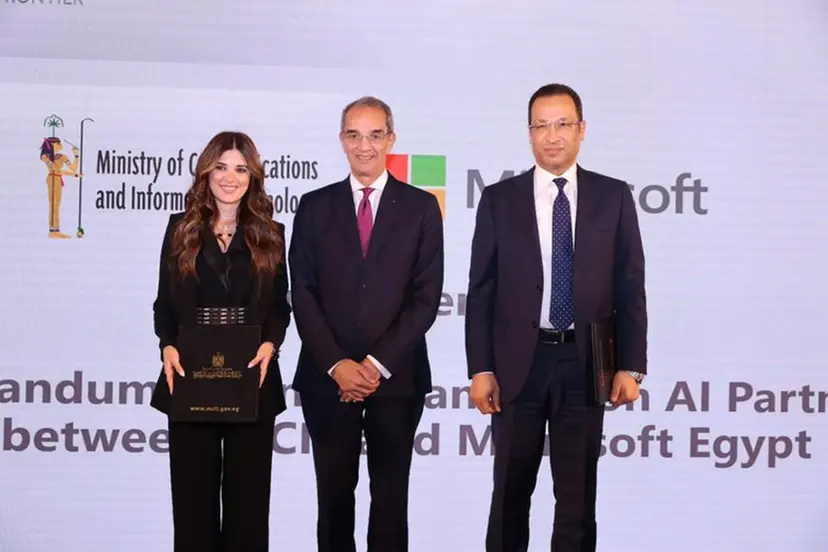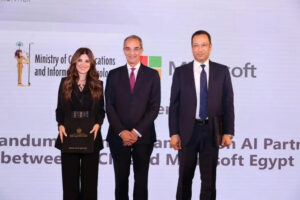


Under the auspices of His Excellency Dr. Amr Talaat, Minister of Communications and Information Technology, Microsoft today hosted the exclusive ‘AI: Egypt Pathway to a New Frontier’ summit at the historical Abdeen Palace. Guests of honor in attendance included the Honorable Herro Mustafa Garg, US Ambassador to Egypt; and Dr. Rania Al-Mashat, Minister of International Cooperation.
The summit showcased how organizations across Egypt are leveraging the transformative power of Artificial Intelligence (AI) to accelerate innovation, improve productivity, unleash creativity, and deploy groundbreaking solutions that tackle key challenges facing communities.
The event also drew the participation of several government officials, business leaders, leading IT professionals, developers, and startups to spotlight how the latest advancements in AI are powering the next phase of digital transformation in Egypt. Experts at the event also highlighted how the AI technology has evolved beyond automating work tasks and is today being utilized by organizations of all sizes and across all industries to extract and analyze valuable insights and unlock the full potential of their operations.
AI: Egypt Pathway to a New Frontier featured opening remarks by several esteemed dignitaries including the Honorable Herro Mustafa Garg, US Ambassador to Egypt; Dr. Rania Al-Mashat, Minister of International Cooperation; Dr. Amr Talaat, Minister of Communications and Information Technology, and renowned Egyptologist Dr. Khaled El-Anany.
H.E. Dr. Amr Talaat, Egypt’s Minister of Communications and Information Technology, stated that Egypt is keeping pace with the international movement in the field of artificial intelligence, and pointed out that Egypt has advanced 46 positions over the past three years on the Government AI Readiness Index, issued by the World Bank. He further explained that a societal dialogue discussing the second phase of the national AI strategy, will take place within the telecommunications and information technology sector community soon, aiming to benefit from the opinions of experts and specialists. He added that the strategy’s pillars are set to introduce more capacity-building programs in the field of AI, continue building systems using AI, and raise societal awareness about such technologies.
Furthermore, Dr. Amr Talaat elaborated on the state’s efforts in the field of artificial intelligence, highlighting the establishment of the National Council for Artificial Intelligence in 2019. He stressed that the first phase of Egypt’s AI strategy was also developed to include a number of significant elements. He stated that the Ministry of Communications and Information Technology is currently cooperating with the Ministry of Higher Education to expand the skill’s base in AI specialties to prepare competent calibers in this field. The Minister confirmed that numerous academic institutions in Egypt have dedicated AI specializations; highlighting Egypt University of Informatics which serves as a cornerstone for the instruction of artificial intelligence.
Dr. Amr Talaat added that the Applied Innovation Center has been established, with the objective of developing digital solutions utilizing IoT and AI technologies to address developmental, societal, and economic needs in various sectors encompassing agriculture and healthcare. He called for collaborative initiatives between the government sector, international companies, local companies, and civil society organizations to raise awareness about the importance and capabilities of AI, while shedding light on what it can offer, in addition to the risks associated with it.
Within the same context, Dr. Amr Talaat noted that Generative AI is the latest qualitative leap in AI capabilities, emphasizing the importance of developing homegrown technologies to achieve positive impacts on society.
Studies have estimated that the potential impact of AI on Middle Eastern economies will exceed $320 billion by 2030. In Egypt, AI is set to contribute over $42.7 billion to the economy by 2030, or 7.7% of GDP. Witnessing the positive impact and economic growth that AI is driving today, Microsoft is committed to making the promise of AI real in Egypt to further accelerate digital transformation in line with the country’s National AI Strategy and Digital Egypt vision.
Speaking at the event, Mirna Arif, General Manager, Microsoft Egypt, reinforced Microsoft’s commitment to an AI-powered future in Egypt. “At Microsoft, we believe that AI is the ultimate amplifier, and we are focused on responsibly creating AI solutions that enable people to achieve greater productivity, growth, and satisfaction in the work that they do. We will continue to work closely with the Ministry of Communications and Information Technology and the Ministry of International Cooperation to democratize access to the latest breakthroughs in AI through our trusted cloud to help individuals and businesses across all industries access the tools and resources they need to build their own AI applications, drive innovation, and advance the growth of the Egypt’s digital economy.”
The summit also spotlighted how Microsoft’s trusted Azure AI, Azure OpenAI Service, and Copilot technologies are empowering organizations of all sizes and across all industries to create cutting-edge AI solutions that tackle key challenges and drive innovation.
Today, Microsoft strives to make AI innovations available within government organizations and companies around the world and urges them to find innovative ways to add value to their business. As a result, more than 85% of Fortune 100 companies are using Azure AI solutions. Across the region, organizations large and small are developing Azure AI solutions because they can achieve more at scale, more easily, with the proper enterprise-level privacy, security and responsible AI protections that Azure offers.

Copyright © 2025 IOT Online Store. All Rights Reserved. | Another Cyber Gear Site.